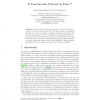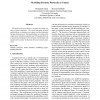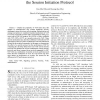106
click to vote
FSEN
2007
Springer
15 years 8 months ago
2007
Springer
Abstract. In this paper we offer a novel methodology for verifying correctness of (timed) security protocols. The idea consists in computing the time of a correct execution of a s...
104
click to vote
IEEEIAS
2007
IEEE
15 years 8 months ago
2007
IEEE
We model security protocols as a game tree using concepts of game semantics. The model interprets protocol specifications as strategies over a game tree that represents the type ...
113
click to vote
ICDE
2007
IEEE
15 years 8 months ago
2007
IEEE
The correct implementation of security protocols is a challenging task. To achieve a high degree of confidence in an implementation, as with any software, ideally one requires bot...
ICCCN
2007
IEEE
15 years 8 months ago
2007
IEEE
— Despite the popularity of VoIP these days, this method of communication may present significant security challenges in terms of privacy and accounting. Authentication and messa...
132
click to vote
CSFW
2007
IEEE
15 years 8 months ago
2007
IEEE
Most model checking techniques for security protocols make a number of simplifying assumptions on the protocol and/or on its execution environment that prevent their applicability...
FSTTCS
2009
Springer
15 years 8 months ago
2009
Springer
We present a symbolic framework for refinement and composition of security protocols. ework uses the notion of ideal functionalities. These are abstract systems which are secure b...
171
click to vote
FOSAD
2009
Springer
15 years 8 months ago
2009
Springer
We introduce the Open-source Fixed-point Model Checker OFMC for symbolic security protocol analysis, which extends the Onthe-fly Model Checker (the previous OFMC). The native inpu...
130
click to vote
ESWS
2009
Springer
15 years 8 months ago
2009
Springer
We propose a middleware for automated implementation of security protocols for Web services. The proposed middleware consists of two main layers: the communication layer and the se...
116
click to vote
COMPSAC
2009
IEEE
15 years 9 months ago
2009
IEEE
As computing technology becomes increasingly pervasive and interconnected, mobility leads to shorter-lasting relationships between end-points with many different security requirem...
CADE
2008
Springer
16 years 2 months ago
2008
Springer
Abstract. The application area of security protocols raises several problems that are relevant to automated deduction. We describe in this note some of these challenges.



